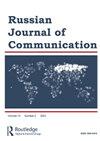Keeping channels open or screening out? The digital practices of Baltic Russian-speakers during the Russia-Ukraine conflict
Q1 Social Sciences
引用次数: 4
Abstract
ABSTRACT Inspired by Couldry’s conceptualisation of media-related practices, the authors investigate the ways Baltic Russian-speakers manage their digital information-seeking (sources of news) practices and interaction (communication partners). Amidst the Russia-Ukraine conflict and the ensuing tensions between Russia and the West, we consider how these digital practices lead to ideological heterogeneity or homogeneity. The conflict between Russia and Ukraine has put the transnational affiliations and practices of Baltic Russophones under pressure. This paper therefore asks how the polarised political environment and securitisation of the cross-border media practices of Baltic Russian-speakers by the national political elite has shaped how individuals respond by keeping channels open or screening content out. Based on a mixed-method study of the digital practices of Russian-speakers living in Estonia and Latvia, the authors argue that practices supporting digital homophily and digital heterophily are not mutually exclusive but appear in specific configurations. The avoidance of counter-oppositional views (screening out) is not absolute but rather mixed with practices that open channels from time to time.保持渠道畅通还是屏蔽渠道?俄罗斯-乌克兰冲突期间波罗的海俄语使用者的数字实践
受Couldry对媒体相关实践概念化的启发,作者研究了波罗的海俄语使用者管理其数字信息寻求(新闻来源)实践和互动(沟通伙伴)的方式。在俄乌冲突以及随后俄罗斯与西方之间的紧张关系中,我们考虑了这些数字实践如何导致意识形态的异质性或同质性。俄罗斯和乌克兰之间的冲突给波罗的海俄罗斯人的跨国关系和做法带来了压力。因此,本文将探讨两极分化的政治环境和国家政治精英对波罗的海俄语使用者跨境媒体实践的证券化,如何影响个人如何通过保持渠道开放或屏蔽内容来应对。基于对生活在爱沙尼亚和拉脱维亚的俄语使用者的数字实践的混合方法研究,作者认为支持数字同质性和数字异质性的实践并不是相互排斥的,而是以特定的配置出现的。对对立意见的回避(排除)不是绝对的,而是与不时打开渠道的做法混合在一起的。
本文章由计算机程序翻译,如有差异,请以英文原文为准。
求助全文
约1分钟内获得全文
求助全文
来源期刊

Russian Journal of Communication
Social Sciences-Political Science and International Relations
自引率
0.00%
发文量
0
期刊介绍:
Russian Journal of Communication (RJC) is an international peer-reviewed academic publication devoted to studies of communication in, with, and about Russia and Russian-speaking communities around the world. RJC welcomes both humanistic and social scientific scholarly approaches to communication, which is broadly construed to include mediated information as well as face-to-face interactions. RJC seeks papers and book reviews on topics including philosophy of communication, traditional and new media, film, literature, rhetoric, journalism, information-communication technologies, cultural practices, organizational and group dynamics, interpersonal communication, communication in instructional contexts, advertising, public relations, political campaigns, legal proceedings, environmental and health matters, and communication policy.
 求助内容:
求助内容: 应助结果提醒方式:
应助结果提醒方式:


